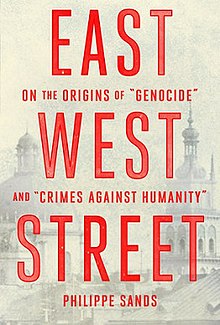Philippe Sands, a practicing barrister in the United Kingdom who represents clients before the International Court of Justice and other international courts and tribunals, gave an informal talk organized by International Legal Studies Program Director Mike Newton earlier this month.
Sands serves as Professor of the Public Understanding of Law at University College of London and is currently the Samuel and Judith Pisar Visiting Professor of Law at Harvard Law School. He is Vanderbilt University’s 2023-2024 Holocaust Memorial Lecturer.

His 2016 book, East West Street: On the Origins of Crimes Against Humanity and Genocide, received the 2016 Baillie Gifford Prize, the 2017 British Book Awards Non-Fiction Book of the year, and the 2018 Prix Montaigne.
Sands noted that the U.S. and U.K. legal systems are unique in that lawyers from both nations can represent other nations in disputes against their own governments. As an example, he discussed a case that became the subject of most recent book, The Last Colony: A Tale of Exile, Justice, and Britain’s Colonial Legacy, in which he represented the African nation of Mauritius against the United Kingdom in the International Court of Justice.
Hired by the prime minister of Mauritius in 2010, Sand represented the government of Mauritius and approximately 2,000 former inhabitants of the Chagos Islands against the United Kingdom in the International Court of Justice. The U.K. had separated the Chagos Islands from the rest of Mauritius in 1965 as part of a global decolonization program and retained its possession of the islands after relinquishing control of Mauritius in 1968. In 1973, the islands’ entire population was rounded up with no notice and evicted from their territory as the result of a secret decision by the British government to allow the United States to build a military base on the islands. In 2019, the International Court of Justice concluded that the United Kingdom’s “decolonization of Mauritius was not lawfully completed,” a decision that obliged the U.K. to return administration of the Chagos Islands to Mauritius.
Sands noted that neither the U.S. nor the U.K. could easily refuse to comply with the ICJ’s decision regarding the Chagos Islands while also vigorously opposing Russia’s illegal annexation of parts of Ukraine, an invasion he characterized as “the biggest act of aggression since 1939.”
Philippe Sands currently represents Palestine before the ICJ, advocating for its right to self-determination. He emphasized that the current conflict between Israel and Hamas “is not a conflict between Israel and Palestine, and Israel is entitled to exercise self-defense.”
Commenting on the conduct of hostilities in both the Ukraine and Israel/Hamas conflicts, he said, “One of the golden rules of international humanitarian law is that you must distinguish between military and civilian targets. Even the argument that Hamas benefits from the use of electricity and infrastructure is not a justification for cutting off an entire population.”
Sands also offered a clear differentiation between the crimes of genocide and crimes against humanity—definitions established in the wake of the Holocaust to hold individuals accountable. “Crimes against humanity affect individuals. Genocide affects groups. The threshold for genocide is very high. It’s much more difficult to prove an intention to destroy a group, and international courts are reluctant to make a finding of genocide. To prove a genocide, you have to prove the individual acted with the intention to destroy a group in whole,” he said.
In addition to East West Street and The Last Colony, Philippe Sands is also the author of Crimes Against Humanity (2016) and The Ratline: Love, Lies, and Justice on the Trail of a Nazi Fugitive (2020).